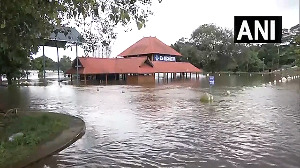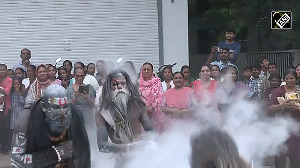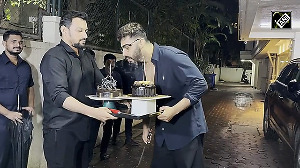It decided the fate of the Indian idol and is now guiding the Indian cricket managers to take instant decisions in the ongoing one-day internationals against Pakistan. Welcome to the world of SMS interactivity -- a new and powerful tool, which experts say is changing the face of interactive programming.
"SMS is a response channel that allows the viewers to communicate feeling, thoughts and all kinds of feedback. In India, this interactivity is becoming popular not only in broadcast but also in print media," says Raj Singh from Active Media, a pioneer in interactive technology.
"As most people think, SMS did not start with Indian Idol. It has been there for the last two years. FM Radio is another popular media, which uses it regularly. Various newspapers and news channels too have programmes where they regularly invite viewer feedback," says Singh.
"Interactive programming is probably as old as broadcasting only the medium has changed with time," says Sudhir Tandon, deputy director general, Doordarshan.
"In early seventies, it was Prashn Manch and Aap ki Baat where viewers sent their response through post cards.
Gradually it shifted to telephone and the medium became popular especially for counselling programmes," says Tandon.
Email was also used for sometime, but SMS holds vast potential and it has surpassed all other mediums, he says.
Citing one such example, he says Doordarshan is using SMS interactivity in a very novel way for ODIs against Pakistan. "It is happening in real time, where questions are asked and output is shown in a minute. People also win lot of prizes in these programmes."
"The viewers are constantly involved in the match and feel a part of decision making with questions like: should no. 5 batsman be moved up? Will the batting side score more than 300? Which next bowler should be brought in, etc," says Singh.
Tandon says the popularity of SMS can be guaged from the fact that in the last ODI over 500,000 messages were received.
He says SMS is being used successfully by TV channels in other countries also. During the Morocco Cup two years back, it was used extensively and questions like who is going to be out next were very popular.
Singh says the future of SMS interactivity is bright. Viewers feel a part of the programme, can be constantly involved and for companies, it means big business and sponsorships.
However, Tandon says interactive programming is an evolving medium and if any new technology comes in place of SMS or email, they would be a switchover.




